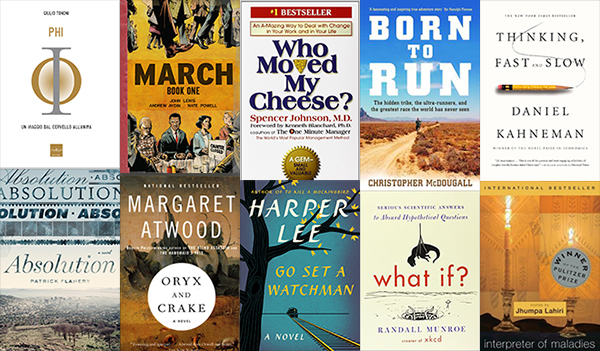To help you idle away the summer, The Phi Beta Kappa Society compiled a list of selected reading. The 2015 Summer Reading List is a combination of new and classic books, suggested by Phi Beta Kappa national office staff, The American Scholar editors, and Phi Beta Kappa members worldwide who contributed on our Facebook page. This is by no means exhaustive, but rather a good start for a summer guided by the love of learning.
Share a comment on our Facebook page and tell us how many of these titles you have read and which titles we should have included.
ΦBK AUTHORS

A Lucky Life Interrupted: A Memoir of Hope by Tom Brokaw (ΦBK, University of South Dakota, 1983)
A powerful memoir from NBC's news anchor and his battle with cancer.
Mindset: The New Psychology of Success by Carol Dweck (ΦBK, Barnard, 1967)
Stanford University psychologist explains how teaching a growth mindset creates motivation and productivity in the worlds of business, education, and sports.
The Elegant Universe: Superstrings, Hidden Dimensions, and the Quest for the Ultimate Theory by Brian Greene (ΦBK, Harvard University, 1983)
Columbia University professor maps out the superstring theory in physics in an approachable format.
From Eve to Evolution: Darwin, Science, and Women's Right in Gilded Age America by Kimberly A. Hamlin (ΦBK, Georgetown University, 1996)
Hamlin offers a voice for evolutionary feminists of the late 19th to discuss their scientific findings in their own words.
The Deepest Human Life by Scott Samuelson (ΦBK, Grinnell College, 1995)
Watch Samuelson's lecture from the Rhodes College Phi Beta Kappa chapter event, "Communities in Conversation."
A grounded and personal approach to philosophy and how it dictates life.
STAFF PICKS

The Library: A World History by James W. P. Campbell
A study of the everlasting sanctuary that is the library.
How to Bake π: An Edible Exploration of the Mathematics of Mathematics by Eugenia Cheng
A delicious course of easy-to-swallow math concepts explained through recipes.
All The Light We Cannot See by Anthony Doerr
Stunning World War II era page-turner about the intersection of the lives of a blind French girl and German boy.
How Not to Be Wrong: The Power of Mathematical Thinking by Jordan Ellenberg
Bringing to life the foundations of math and reason in an engaging way for everyday use.
Barbarian Days: A Surfing Life by William Finnegan
Acclaimed New Yorker writer dives into a lifelong obsession with surfing and its resulting adventures.
James Merrill: Life and Art by The American Scholar's poetry editor, Langdon Hammer
"It's a long book, but it is brilliant at tying the colorful life of this important poet (the hugely wealthy son of a founder of Merrill, Lynch) to the autobiographical poetry itself." —Bob Wilson, The American Scholar
The Devil in the White City by Eric Larson
Thrilling tale of two men--one an ambitious architect, and the other, a cunning serial killer--and the 1893 World's Fair in Chicago.
Get in Trouble by Kelly Link
"Magic for adults." —Stephanie Bastek, The American Scholar
Between You & Me: Confessions of a Comma Queen by Mary Norris
"After devouring an excerpt of Norris's book in the February New Yorker, I can't wait to delve back into the world of semicolons, serial commas, and twitchy copy editors." —Laura Battos, The Phi Beta Kappa Society
Ravaged: Art and Culture in Times of Conflict edited by Jo Tollebeek and Eline van Assche
The effects of war are often spoken about in terms of casualties of life, but here they are expanded to include casualties of culture.
MEMBER RECOMMENDATIONS

Oryx and Crake by Margaret Atwood Rather than "science fiction," which creates new technologies in the future, Atwood describes her work as "speculative fiction" because the post-apocalyptic world she creates includes things in existence in the present.
Absolution by Patrick Flanery
Set in post-apartheid South Africa, an author's journey to reconciliation through her biographer's search for truth.
Who Moved My Cheese?: An Amazing Way to Deal with Change in Your Work and in Your Life by Spencer Johnson
A guide to understanding how we react to change, told through the perspective of two mice and two "little people."
Thinking Fast and Slow by Daniel Kahneman
Combining several decades of cognitive research, Kahneman explains the two modes of thought in terms of prospect theory, cognitive biases, and happiness.
Interpreter of Maladies by Jhumpa Lahiri
A collection of nine short stories by Indian American author Jhumpa Lahiri about the lives of Indians and Indian Americans who are caught between the culture they have inherited and the "New World."
Go Set a Watchman by Harper Lee
The earliest known work from the beloved author, Watchman follows up on the lives of the characters featured in To Kill A Mockingbird and the transformation of 1950s America.
March: Book One by John Lewis
A first-hand account, in graphic novel form, of Congressman John Lewis's lifelong struggle for civil and human rights.
Born to Run by Chris McDougall
McDougall follows the Tarahumara Indian tribe in the Mexican Copper Canyons and explores why the human species has developed an ability for endurance running.
What if? Serious Scientific Answers to Absurd Hypothetical Questions by Randall Munroe
Entertaining explanation of scientific questions for the inner nerd.
Phi: A Voyage From the Brain to the Soul by Giulio Tononi
Neuroscientist Tononi explores the depths of consciousness through the eyes of Galileo.


